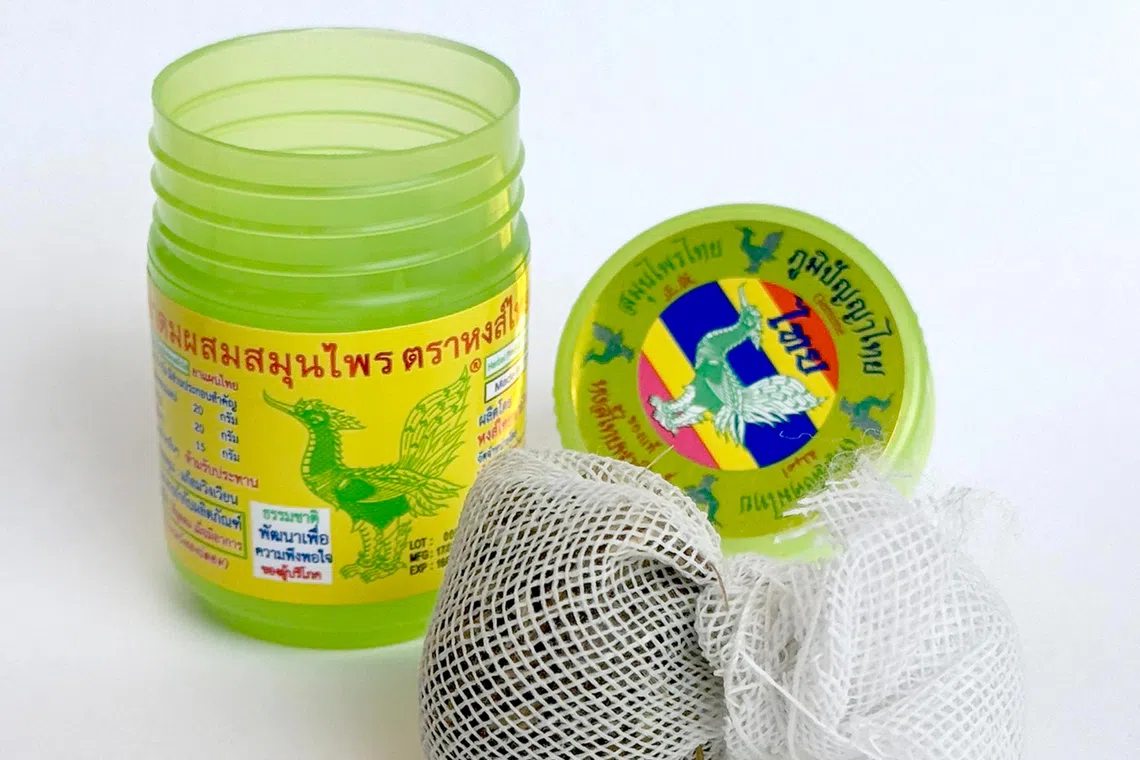Contaminated Thai herbal inhalers can irritate the nose and throat
Sign up now: Get ST's newsletters delivered to your inbox

Vulnerable users of the contaminated inhalers may be at risk of lung infection, said health experts.
ST PHOTO: WANG HUI FEN
Follow topic:
- Contaminated herbal inhalers, like the recalled Hong Thai inhaler, pose risks of lung infections, especially for vulnerable groups like the elderly and those with lung disease.
- Ingredients such as menthol, camphor, and eucalyptus in herbal inhalers can cause side effects, and excessive inhalation may lead to lung inflammation or trigger asthma.
- Singapore's HSA is advising consumers to stop using the recalled inhaler, while also notifying e-commerce platforms to remove affected listings.
AI generated
SINGAPORE – Herbal inhalers contaminated with microbes such as bacteria, yeast or mould may irritate a user’s nose and throat. Vulnerable users may also be at risk of lung infection, said health experts.
Their comments follow the recall of a batch of Hong Thai Herbal Inhaler Formula 2 on Oct 29, after the Thai Food and Drug Administration (FDA) detected unsafe levels of microbial contamination
Vulnerable groups include the elderly, children and people with pre-existing lung disease or a weakened immune system.
For these individuals, introducing pathogenic organisms into the airway may lead to a lung infection, said Adjunct Associate Professor See Kay Choong, a senior consultant in the Division of Respiratory and Critical Care Medicine at the National University Hospital.
Dr Golda Wang, a senior principal clinical pharmacist at Alexandra Hospital, concurred that those who use therapeutic products such as inhalers that exceed safe microbial limits have a higher risk of developing acute and chronic health hazards, including lung infections and allergic responses.
Dr Alvin Ng Choon Yong, a respiratory and intensive care medicine specialist at The Respiratory Practice, said: “Often for such products, if you choose to use them, then you have to trust the product company’s indications.
“If the product contains bacterial and mould contamination, then there is a risk of developing pneumonia from the inhaled source, as pneumonia is an infection of the lung via aerosolised bacteria and viruses.”
Herbal inhalers, also known as ya-dom, are widely used in Thailand to clear nasal passages, relieve dizziness, calm the mind and stay alert during long drives or while studying.
Some of the products have found their way to users in Singapore through e-commerce platforms such as Shopee, Lazada and Carousell.
These inhalers typically contain ingredients like menthol, camphor and eucalyptus, which Prof See said can make breathing feel easier and reduce the sensation of nasal congestion. Many herbal inhalers use similar ingredients.
Menthol vapours can also lessen the sensation of breathlessness, he said, although they may trigger asthma or allergic rhinitis attacks in people with these conditions.
Camphor may stimulate the central nervous system, but it is toxic if ingested and can cause seizures, apnoea (temporary cessation of breathing) and even death in severe cases, he said.
Myocarditis, or inflammation of the heart muscle, has been reported after ingestion of large doses of camphor, while isolated cases of camphor-induced seizures have been observed in young children following gastrointestinal, skin or inhalation exposure, Prof See added.
Eucalyptus inhalation may relieve anxiety and pain, but it can also induce seizures and may cause vocal cord dysfunction, he said.
Dr Wang said that, nevertheless, eucalyptus is largely safe when inhaled, with toxicity mostly associated with oral ingestion.
Prof See advised against prolonged or excessive inhalation of herbal vapours, as it may lead to lung inflammation and damage, known as lipoid pneumonia. He added that people with asthma or chronic lung disease should be cautious about this.
Applying these products to the eyelids, mouth or face can cause eye inflammation and injury, he said, cautioning against their use on children or around infants.
He said that intermittent use a few times a day by a healthy adult is generally considered low-risk, provided the product is from a reputable source and free of contamination.
“It is prudent to limit use to occasional symptomatic relief rather than continuous daily use over long periods,” he said.
“People with asthma, chronic obstructive pulmonary disease or chemical sensitivities should avoid regular use or consult their doctor first. These products should also not be given to infants or children,” he added.
“We advise that consumers purchase products that are properly labelled and sourced from reputable retailers, to ensure compliance with Singapore’s regulatory standards.”
On Oct 29, the Thai FDA said using inhalers that have contaminants such as mould spores and the bacterium Clostridium perfringens – which was found in the affected batch of Hong Thai herbal inhalers – may cause respiratory infections, breathing difficulties, wheezing and coughing.
Singapore’s Health Sciences Authority (HSA) said it is in contact with the Thai FDA to find out more.
HSA said the inhaler is considered traditional medicine and, as such, is not subject to its approval and licensing for sale here.
Even so, HSA is advising consumers who have purchased the recalled batch of the product to stop using it.
The authority said it has also notified Shopee, Lazada and Carousell to conduct thorough checks for the affected batch on their platforms and remove the listings.
The key ingredients in the herbal inhalers, such as menthol and camphor, are not exclusive to the Hong Thai brand. They can also be found in similar products sold here, said Dr Wang.
These include Vicks VapoRub medicated ointment, which can be applied directly to the chest and throat to suppress coughs, or the Tiger Balm inhaler, which is marketed as offering instant relief from nasal congestion.
Dr Wang added that the Hong Thai inhaler is intended to be inhaled without direct contact with the nasal cavity.


